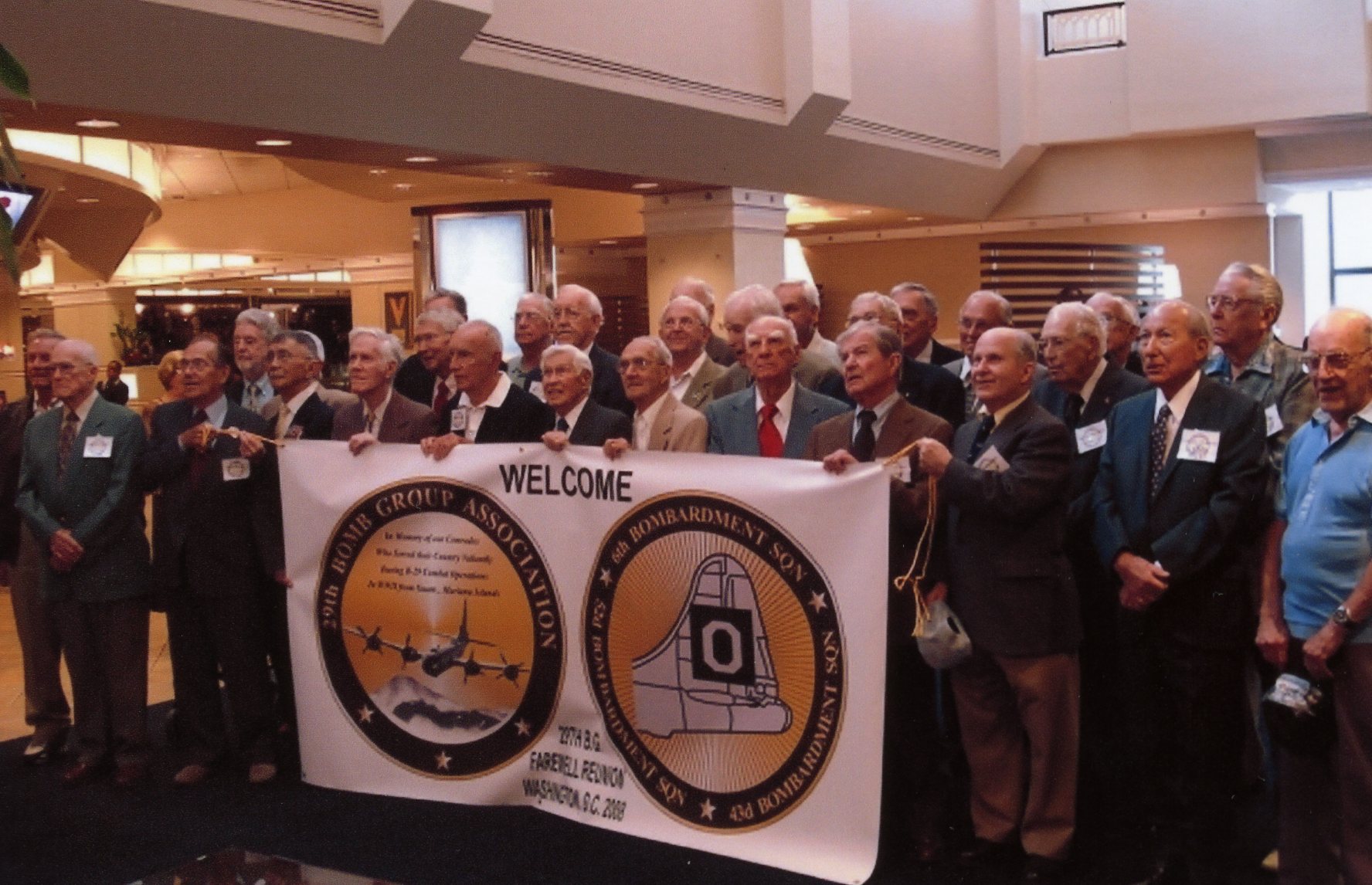Farewell Reunion - 314th Bomb Wing, 29th Bomb Group
Washington, DC - 2008
The following is an article about the reunion that appeared in USA Today on September 8, 2008.
The original article can be accessed by clicking on the link below :
WWII Vets Face Bittersweet Salute
By Andrea Stone, USA TODAY
WASHINGTON — As Joe Chovelak stands in the World War II Memorial here, his bushy white eyebrows bristle at the notion that his beloved 29th Bomb Group is holding its last reunion.
"That is harsh. I mean, 'last reunion' is like going to a funeral," says Chovelak, 83, the tireless historian of the Army Air Forces that bombed Japan in 1945 and came here this weekend for the group's 13th and final get-together. "This is a farewell reunion."
Farewell or last — the World War II generation is dwindling. Of 16 million who served, only one in eight remain. The Department of Veterans Affairs expects 300,000 veterans will die this year.
Today, Chovelak, of Naperville, Ill., will present a box of memorabilia to the Library of Congress. It will include a roster of the 2,500 men of the 29th Bomb Group. The unit's other records will be donated to an Air Force museum in Dayton, Ohio.
"I hate to see it end, but everything has to come to an end sometime," says Cedric Fowler, 91, a B-29 radar mechanic who drove from Indianapolis with his wife for the reunion.
"They're getting to where they can't travel," says his wife Dorothy, 90. "You notice all of them here are in wheelchairs, with canes and walkers."
The reunion drew nearly 200 people. But only 40 were veterans; seven others were widows of veterans. The rest were family of the men who flew and maintained three squadrons of B-29 Superfortresses on Guam in the Mariana Islands. The group's president, Ben Robertson, was too ill to travel from California.
Still, the turnout beat last year's gathering in New Orleans, when only 29 veterans attended. "I guess they heard this was the last reunion," Fowler says.
Robertson said it was up to "the heirs" to keep the group going under a different name. On Saturday, Allan Pawlikowski, who took over as group secretary after his father died on Pearl Harbor Day in 2004, said a committee had formed to carry on the memory of the 29th.
"The children are going to take over," says reunion organizer Anthony Ferraro, 42, a California, Md., aerospace engineer whose grandfather, Harold Brennan, died on a mission over Japan.
Alfred Tsang, 84, doesn't believe this is the last reunion. But in case it is, he came from Golden Valley, Minn., "just to be with the guys." A navigator who served in a segregated Chinese-American unit before joining the 29th, the former deputy attorney general of Indiana leans on a cane. He and Herb Small are the only ones left from their 11-man crew.
Small, 84, of Hamden, Conn., came with three sons and a grandson. Like many in the group that held its first reunion in 1985, he never spoke about the war until it was long over.
"When I was young, if a group of men got together and started talking war stories, I would have nightmares," says Small, a retired homebuilder. "Now I can talk about it like it was an ice cream social. Time heals all."
Or almost all. Tsang and Small took part in the March 9, 1945, firebombing of Tokyo, which killed about as many people as died immediately after the subsequent Hiroshima atomic blast. "It never bothered me to kill people because you never saw them," says Small. "But after the war, I read a magazine article by a foreign correspondent who was there that night. He talked about bodies stacked up in the street 50 feet high. Women, children, babies. … That got me."
This weekend, though, most gathered at a hotel in Arlington, Va., preferred other war stories.
Naomi Mitchell, 87, reminisced about her late husband Harry, a gunner. Married before the war with two small children, she recalls standing with other wives near a runway in Kansas and watching "our guys climb up and fly away and disappear in the sky. We were crying our eyes out."
Mitchell worked in a factory making .50-caliber bullets. She didn't learn until years later at a reunion that "whenever they were having trouble getting back to Guam … they threw out everything that was heavy," she says. "I said, 'You threw out that ammunition that I worked hard to make?' He said, 'Well, what did you want back? Your husband or your damned ammunition?' "
Who will be left to tell such stories? asks Mitchell, paging through a scrapbook. "There are publications about it but they don't have the personal touch."
Andrew Small, 21, Herb's grandson, grew up hearing stories from "Pop," but the University of Pennsylvania student also enjoyed hearing from others. "It's really great to hear more perspectives," he says. "And to meet Al, who was in the plane with him, is just incredible."
Paul Cahalan didn't make the last reunion; he died last year. But the B-29 radio operator's wife did, traveling from Huntsville, Ala.
"It meant so much, this reunion, that I just had to come with my children to honor him," says Atha Cahalan, 84.
Adds her son Mike, 45, also an Air Force vet: "It's somewhat sad to think it's coming to an end."





